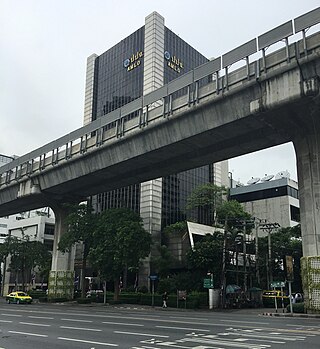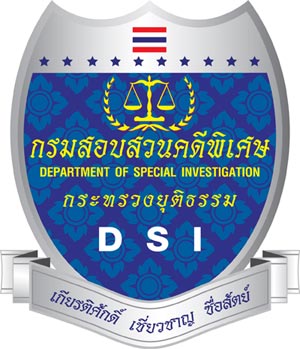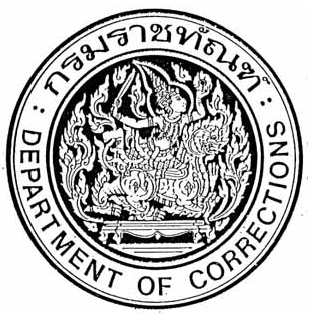Related Research Articles

Khun Ying Pornthip Rojanasunand, also spelled Porntip Rojanasunan is a Thai forensic pathologist, a currently member of the Senate of Thailand and medical doctor. First appearing in the media in 1998, her work and outlandish hairstyles quickly granted her celebrity status, and she became the best known of Thailand's forensic scientists. An author of several best-selling memoirs, her work introduced the Thai public to the role of DNA evidence, among other forensic methods, in crime investigations.

Bang Bo is a district (amphoe) of Samut Prakan province in Thailand.

The Anti-Money Laundering Office (AMLO) is Thailand's "key agency responsible for enforcement of the anti-money laundering and the counter-terrorism financing law." It was founded in 1999 upon the adoption of the Anti-Money Laundering Act, B.E. 2542 (1999) (AMLA). AMLO is an independent governmental agency. It has the status of a department functioning independently and neutrally under the supervision of the minister of justice, but is not part of the justice ministry. In 2016, Prime Minister Prayut Chan-o-cha ordered by the cabinet resolution change the command to under the supervision of the Prime Minister directly.
A long-range locator is a class of fraudulent devices purported to be a type of metal detector, supposedly able to detect a variety of substances, including gold, drugs and explosives; most are said to operate on a principle of resonance with the material being detected.

Explosive detection is a non-destructive inspection process to determine whether a container contains explosive material. Explosive detection is commonly used at airports, ports and for border control.

The Ministry of Interior (MOI) is the government body charged with overseeing policing and border control in Iraq. The MOI comprises several agencies, including the Iraqi Police, Highway Patrol, Traffic Department, Emergency Response Unit, Explosive Ordnance Disposal Unit, and Department of Border Enforcement. Following passage of the Facilities Protection Service Reform Law, the Ministry absorbed FPS personnel previously spread among other ministries. The MOI has approximately 380,430 employees, and the Ministry of Finance approved US$3.8 billion for its 2008 budget, representing a 21% growth over the previous year.
Sniffex and Sniffex Plus are fraudulent explosive detection systems produced by Homeland Safety International.

The Royal Thai Police (RTP) is the national police force of Thailand. The RTP employs between 210,700 and 230,000 officers, roughly 17 percent of all civil servants. The RTP is frequently recognized as the fourth armed force of Thailand since their tradition, concept, culture, skill, and training are relatively similar to the army and most of their officer cadets need to graduate from the Armed Forces Academies Preparatory School before entering the Royal Thai Police Cadet Academy. Officers also undergo paramilitary training similar to the army but with an additional focus on law enforcement.

The Ministry of Justice is a cabinet ministry in the Government of Thailand. The ministry is in charge of the criminal justice system in the kingdom. As well as running prisons and aiding the Royal Thai Police, the ministry also runs the government's drug and narcotic control policies. The ministry is headed by the Minister of Justice, Somsak Thepsuthin. Its fiscal year 2020 budget is 26,757 million baht.

The ADE 651 is a fake bomb detector produced by the British company Advanced Tactical Security & Communications Ltd (ATSC). Its manufacturer claimed it could detect bombs, guns, ammunition, and more from kilometers away. However, it was a scam, and the device was little more than a dowsing rod.
The GT200 is a fraudulent "remote substance detector" that was claimed by its manufacturer, UK-based Global Technical Ltd, to be able to detect, from a distance, various substances including explosives and drugs. The GT200 was sold to a number of countries for a cost of up to £22,000 per unit, but the device has been described as little more than "divining rods" which lack any scientific explanation for why they should work. After the similar ADE 651 was exposed as a fraud, the UK Government banned the export of such devices to Iraq and Afghanistan in January 2010 and warned foreign governments that the GT200 and ADE 651 are "wholly ineffective" at detecting bombs and explosives. The owner of Global Technical, Gary Bolton, was convicted on 26 July 2013 on two charges of fraud relating to the sale and manufacture of the GT200 and sentenced to seven years in prison.
The Quadro Tracker, also known as the Positive Molecular Locator, was a fake "detection device" sold by Quadro Corp. of Harleyville, South Carolina between 1993 and 1996. Around 1,000 were sold to police departments and school districts around the United States on the basis that it could detect hidden drugs, explosives, weapons and lost golf balls. In 1996, the FBI declared it to be a fake and obtained a permanent injunction barring the device from being manufactured or sold. Three principals of Quadro Corp. were charged with mail fraud and conspiracy to commit mail fraud, but were acquitted in a trial held in January 1997.

Meirion Jones is a Welsh journalist. He worked for the BBC from 1988 until 2015 and is now the editor of the Bureau of Investigative Journalism. Former Newsnight presenter Jeremy Paxman described Jones as "a dogged journalist with that obsessional, slightly nutty commitment that marks out all successful investigative reporters".
Caroline Hawley is a British journalist who has been a special correspondent for the BBC News channel since 2007.

The Department of Special Investigation (DSI) is a department of the Ministry of Justice of Thailand. It operates independently of the Royal Thai Police and is tasked with the investigation of certain "special cases". These include complex criminal cases, those affecting national security, those involving organised criminal organisations and those potentially implicating high-ranking government officials or police officers. As of June 24, 2020 the DSI is tasked to investigate and follow up on cases under the Prevention and Suppression of Torture and Enforced Disappearances if and when it becomes law on cases involving torture or forced disappearances.

Corruption in Thailand is a national issue. Thai law provides criminal penalties for conviction of official corruption. Thailand's 2014 military junta, the National Council for Peace and Order (NCPO), stated that fighting corruption would be one of its main focus points, a common practice for military dictatorships following Thailand's frequent military coups. Despite the promises, officials engaged in corrupt practices with impunity, and the NCPO engaged in corrupt practices itself.

Somyot Poompanmoung is a former commissioner-general of the Royal Thai Police and current president of the Football Association of Thailand.

The Department of Corrections is an agency of the Thai Ministry of Justice. Its mission is to keep prisoners in custody and rehabilitate them. Its headquarters is in Suanyai Sub-district, Mueang Nonthaburi District, Nonthaburi Province. As of 2020, Police Colonel Suchart Wongananchai is director-general of the department. Its FY2019 budget was 13,430 million baht.
The National Anti-Corruption Commission is a constitutional organization of Thailand. It is sometimes confused with the Anti-Corruption Organization of Thailand (ACT), a private foundation.

Porlajee "Billy" Rakchongcharoen, a Karen environmental and community activist, was last seen alive in Kaeng Krachan National Park, western Phetchaburi Province, Thailand on 17 April 2014. He was arrested at a park checkpoint by park superintendent Chaiwat Limlikitaksorn and four of his men for alleged illegally collecting wild honey in the forest. Three years earlier, in 2011, Billy had filed a lawsuit against Chaiwat over the May 2011 destruction and burning of houses, and eviction of over 20 Karen families living in Jai Paen Din, meaning 'heart of the land' in the park's Pong Luk Bang Kloy village, in the Huai Mae Phriang Sub-district of Kaeng Krachan District. The national park chief later swore that Billy had been arrested and released on the same day after being questioned for possession of an illegal wild bee honeycomb and six bottles of honey. There are no official records of his arrest or detention. Following Billy's supposed arrest he was never seen alive again. Searches conducted from April–August 2019 discovered human bone fragments in the Kaeng Krachan Dam reservoir. DNA tests of the fragments matched those conducted on Billy's mother, leading the Department of Special Investigation (DSI) to conclude that the bones were Billy's and that he had been murdered. Chaiwat, the former park chief, immediately cast doubt on the DNA test, saying, "...this [DNA test result] is not enough proof to conclusively say the skull fragment is Billy's,..." Chaiwat and others had been charged with Billy's murder but were cleared due to insufficient evidence. Chaiwat was however sentenced to 3 years in prison for dereliction of duty for not reporting the arrest of Rakchongcharoen.
References
- ↑ "UK bans bomb detectors". Bangkok Post . 2010-01-24. Retrieved 2010-01-26.
- 1 2 Staff (2010-02-17). "Bt800-million embarrassment". The Nation. Archived from the original on 2010-02-18. Retrieved 2010-02-17.
- 1 2 "Government statement on 'bomb detectors' export ban". BBC News. 2010-01-22. Archived from the original on 26 January 2010. Retrieved 2010-01-22.
- ↑ Hawley, Caroline; Jones, Meirion (2010-01-27). "UK warns world about useless 'bomb detectors'". BBC News. Archived from the original on 28 January 2010. Retrieved 2010-01-28.
- 1 2 3 Laohong, King-oua; Piragsa, Surichai (2010-02-17). "ONCB gives go ahead for Alpha 6 test". Bangkok Post. Retrieved 2010-02-17.
- ↑ "Alpha 6 Molecular Detector" (PDF). TNS Networking Solutions Pvt. Ltd. Archived from the original (PDF) on 2010-03-06. Retrieved 2010-02-17.
- ↑ "The Export Control (Amendment) Order 2010. Statutory Instrument 2010 No. 121". Office of Public Sector Information. 2010-01-27. Retrieved 2010-01-28.
- ↑ Peel, Michael; Pfeifer, Sylvia (2010-06-08). "Police conduct raids in bomb detector probe". The Financial Times. Archived from the original on June 11, 2010. Retrieved 2010-06-08.
- ↑ "Police raids expand bomb detector probe". BBC News. 2010-06-08. Archived from the original on 10 June 2010. Retrieved 2010-06-08.
- ↑ "Five charged by Overseas Anti Corruption Unit (OACU)" (Press release). City of London Police. 12 July 2012. Archived from the original on 19 August 2012. Retrieved April 3, 2013.
- ↑ "Bomb detector scam: Three people go on trial". BBC News. 29 May 2013. Retrieved 27 January 2014.
- ↑ "Fake bomb detectors located Madeleine McCann". Hampstead and Highgate Express. 6 June 2013. Retrieved 28 January 2014.
- ↑ Marshall, Tom (19 June 2013). "Jury clears fake bomb detector salesman who thought he found Madeleine McCann". Hampstead and Highgate Express. Retrieved 27 January 2014.
- ↑ "Fake bomb detector husband jailed for three years". BBC News. 3 October 2014.
- ↑ Laohong, King-oua; Srinuanjan, Sunan (2010-01-28). "Drug busters say they have better detector". Bangkok Post. Retrieved 2010-02-17.
- ↑ Staff (2010-01-29). "GT200 little more than a dowsing rod: scientist". The Nation. Archived from the original on 2010-02-01. Retrieved 2010-02-17.
- ↑ Anucha, Charoenpo (2010-02-15). "Detector tests broadened, ministry says". Bangkok Post. Retrieved 2010-02-17.
- ↑ Laohong, King-oua (13 November 2012). "Brits ask DSI to testify on Comstrac". The Bangkok Post. Retrieved 4 October 2014.
- ↑ "Sniffer dogs better: Thai PM". AFP. 14 February 2010. Retrieved 2010-02-16.
- ↑ Laohong, King-Oua (2013-04-25). "NACC flags charges in GT200 case". Bangkok Post. Retrieved 22 Feb 2021.
- ↑ "Failure of Alpha Probe" (Opinion). Bangkok Post. 29 May 2018. Retrieved 29 May 2018.